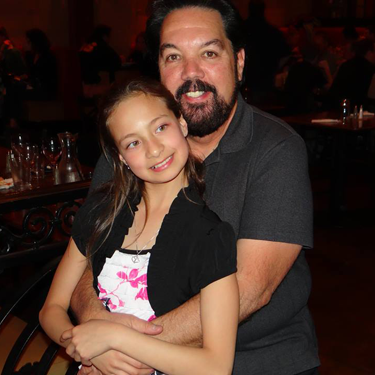A while ago I wrote an article titled “Let’s Play Jenga, Backward.” Instead of starting from a squarely stacked tower, I likened parenting after fostering or adopting older children to starting the game with a tower full of holes. Your job is to find the missing pieces and fit them back into place, to create a solid tower. Recently, we found one of those missing pieces, and we’re working to slide it into its proper place into my daughter’s tower, making her a little stronger and a little more at peace.
Rosanna was removed from her birth mother at the age of six months along with her brother, Alejandro, who was seven years old then. Together they began a seven-year journey through the foster care system, 14 placements in all. After two placements that lasted two years each, they moved through 12 different placements in the next three years. Who could come through such a childhood unscathed? These are our children, and theirs is a story worth telling and hearing.
When Childhood Is a String of Disappointments
Rosanna is now 14 and in the ninth grade. She is an amazing teenager, beautiful inside and out and full of dreams, hopes, goals, and the self-confidence to hold her head high as she walks forward through life. At least, that’s the Rosanna she wants the world to see. However, I am privileged (and I don’t use that particular word all the time!) to see the real Rosanna at times, and it’s that specific young lady I admire tremendously—the one who melts my heart and can bring me to tears on the very rare occasions when she shares her guarded, intimate feelings. It’s she who I spend most of my time trying to figure out, however ill-prepared I feel for this role.
My daughter feels some anger, fear, abandonment, and loss of attachment from her time in foster care, but what seems to be at the root of most of her struggles is disappointment. She was cared for by her biological mother from birth to six months, enough time to know her mother’s scent, her voice, to recognize how she held her, and how she shook her (yes, even the bad feelings). She absorbed all the subconscious sensory input that helps babies bond to their very first caregiver. Then, one day, she was abruptly removed from her mother’s care, seeing her just a handful of times before her mother’s parental rights were severed. This was Rosanna’s first great disappointment and a defining moment in her life.
For the next two years the children lived with their mother’s sister. This was supposed to become their adoptive home, but the family proved to be unsafe, so they were once again suddenly removed from familiar caregivers. Though Rosanna was not even three years of age and knew little about what was happening, she felt it all.
Placement after placement, each failing and falling apart around them, Rosanna and Alejandro simply had to endure. Although they had enough natural survival skills to project an unfazed front, they couldn’t truly understand such a whirlwind of a childhood. Who could?
“How Do I Get Past It All?”
Rosanna and I have had reoccurring clashes about disrespect and the flippant way she sometimes lets me know she’s upset about something. Last night, after one of these arguments with the expected yelling and flared tempers (mostly mine, I’m afraid), we finally talked about all of this. As that look of fear, grave sadness, and yearning in her eyes spilled out and down her cheeks, I believe she finally saw the missing piece and found its place within her. She threw herself into my arms and, for the first time in our seven years together, she sobbed. And when she had cried herself out, we talked and listened to one another and finally connected, and it was true joy.
My daughter has truly had more than her fair share of disappointments in her life. She has every right to feel everything that she feels, but, as I explained to her, with this new awareness comes a real and weighty decision—will she allow this to rule her life, or will she beat it? Will she let her mistrust and hard heartedness guide her and ultimately win her over, or will she conquer it, learn from it and grow?
Perhaps we needed to wait until she was mature enough to understand all of this and truly make a decision. Although the struggling and arguing and darker days weren’t fun or easy, perhaps the past seven years served a purpose in helping all of us understand this missing piece. All I really know is that, last night, after we fought, separated for a little while, and regrouped, hanging out on my bed at 10 o’clock that night, she whispered, “How do I get past the disappointment of it all?” and I replied, “Together, with us.”

The author with his daughter, several years before this essay was written.
We Must Be as Strong as They Are
Last year Rosanna’s older brother enlisted in the U.S. Air Force and is now stationed on the opposite coast—another huge disappointment for her. She struggles with these new feelings of his daily absence, but, as we all must learn, life will always present us with change. Somehow we have to learn the difference between life’s expected and unexpected changes. She couldn’t understand these things at the age of two or four or six, but now, at 14, she can better hear and understand not only the present, but her past as well.
I can’t put into words what I imagine these kids in foster care must feel, but I can find the words to express my heartfelt admiration and respect for their willingness to keep going, even though they must battle feelings of anger, fear, disappointment, and abandonment every minute of every day. No, fostering and adopting older children isn’t easy—it can actually be rough some of the time—but the acting out, the arguing, the defiance is often connected to events from their past and is all a part of them trying to anchor down, attach, trust. If we crumble at the first sign of trouble, we are of no use to them. I feel like my husband and I had to prove to our kids that we were just as strong as they were, that we were a match! Maybe that was their way of selecting us? In any case, seven years after meeting them, I finally feel that we are closer to being a real, solid family.
In the end, I know the bad days will slowly slip away from my memories and I will be left with mostly the good. Tonight will always be among those good, solid memories—the night Rosanna asked me how, how does she get beyond it all. Because I know one thing for certain: It is love that she craves, it is love that will get her through it, and it is love for her and her brother that we have in abundance.

